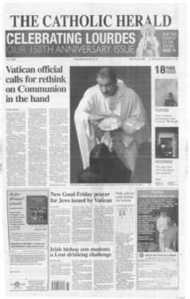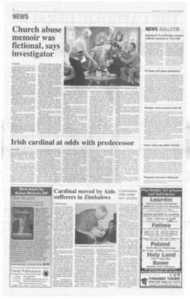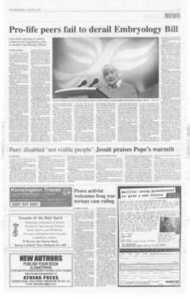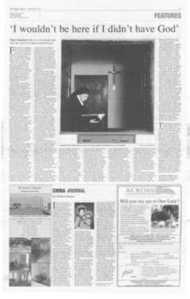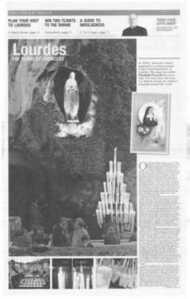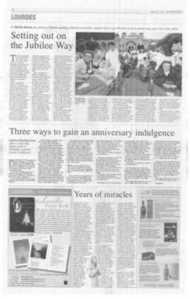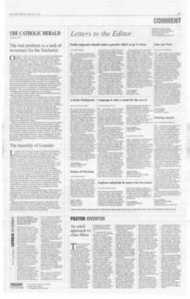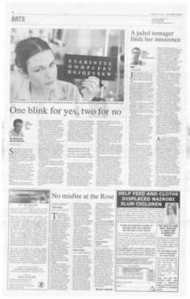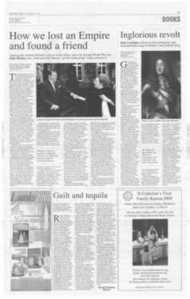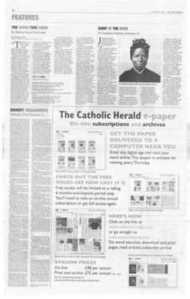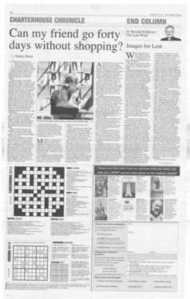Page 3, 8th February 2008
Page 3
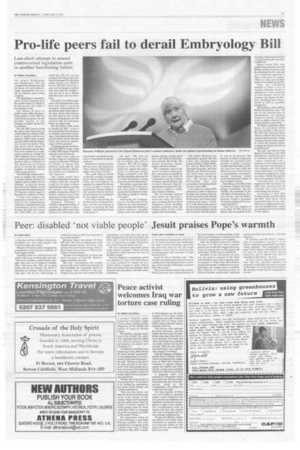
Report an error
Noticed an error on this page?If you've noticed an error in this article please click here to report it.
Tags
Share
Related articles
Catholic Peer Collapses In Lords ' After Criticising...
Cardinal Urges Pm To Grant Free Vote On Hybrids Bill
Britain Defies Consensus On Human Cloning
Pro-lifers Push For End To Destructive Experiments
Bishop Defies Hecklers At Pro-life Rally
Pro-life peers fail to derail Embryology Bill
Last-ditch attempt to amend controversial legislation ends in another humiliating failure
BY SIMON CALDWELL
THE HUMAN Fertilisation and Embryology Bill has completed its passage through the House of Lords without a single amendment from prolife or Catholic peers being accepted.
The legislation is expected to arrive in the Commons later this month where it is likely to be driven into law under a Government whip.
The failure of peers to restrict some of the most hoirifying aspects of the Bill has raised flesh questions over the possible success of any attempts to tighten up the law on abortion.
Pro-life MPs want to lower the upper time limit from 24 weeks while pro-abortion MPs want to legalise abortion on demand within three months and up to birth with the permission of just one doctor. They also aim to allow nurses to perform abortions, permit abortions to be carried out in unlicensed premises, extend the 1967 Abortion Act to Northern Ireland and change the way abortion data is collected so that figures are not broken down to reveal the annual numbers of abortions for socalled social reasons.
The FIFE Bill contains provisions to legalise the creation of human-animal hybrids for research, and so-called "saviour siblings" to provide donor tissue for sick children. It will also abolish the requirement of IVF doctors to have regard to the need of a child for a father.
It does not contain any proposals to amend the Abortion Act but parliamentary clerks have signalled that such amendments can be tabled because the Bill will reform the 1990 HFE Act, under
which the 1967 Act was last changed. Pm-life groups have been encouraged by mounting public unease over Britain's record 200,000 abortions a year, and by disgust at reports that more than 60 children a year are left to die in Britain after they have sun,iveci abortions.
Scientific breakthroughs such as four-dimensional scans have also led to a growing awareness of the humanity of the unborn child. Some specialists have shown that foetuses can feel pain by the second trimester of pregnancy and that survival rates for premature babies are improving.
But the failure of the Lords to amend the Bill — even to prevent the late-term abortions of children with minor handicaps — has fuelled concerns that pro-life efforts will be defeated while pro-abortion amendments will be accepted.
Campaign groups are redoubling their efforts to urge voters to lobby MPs ahead of the Bill arriving in the Commons.
The latest blow came on Monday when an amendment moved by Baroness Williams of Crosby to ensure that embryos could only be used for research when no alternative existed was defeated by 197 votes to 41.
The clause would have required researchers to produce evidence that the research could not be done without using human embryos, and that the project was likely to produce an outcome. About 22 million embryos have been destroyed in experiments and IVF in Britain since 1990.
Baroness Williams, a Catholic, said that the ability of scientists in Japan to reprogramme skin cells so they were identical to embryonic stem cells further cast doubt on the need to experiment on human embryos.
Baroness O'Cathain said the Bill now gave the impression "that a human embryo has no higher status than a fruitfly".
The Lords failed to divide on the Bill, giving it an unopposed third reading. Meanwhile, the Government has signalled its support for the use of dead people's tissues to manufacture human embryos and animal-human hybrids even if consent was not granted by the original donor.
Paul Tully of the Society for the Protection of Unborn Children said the Government is "intent on pushing the Bill through — and making it worse in the process". He said: "We will be campaigning across the country to expose the evils it contains. We will be urging people to lobby their MPs intensively against the degradation of embryonic human beings contained in the Bill and the degrading processes of so-called therapeutic cloning and cross-species fertilisation."
The debate came days after Pope Benedict XVI said scientists were guilty of offences against human dignity by treating embryos simply as "biological matter".
Addressing the Congregation for the Doctrine of the Faith, he said "new problems" which included the freezing of human embryos, designer babies. stem-cell research and human cloning "clearly show how, with artificial insemination outside the body, the barrier protecting human dignity has been broken".
His comments came at the end of a month in which peers also voted down an attempt by Catholic peer Lord Alton of Liverpool to stop the creation of human-animal hybrids, and in which Baroness Deech's amendment to ensure IVF children have a right to a father also resulted in failure.
The Government ensured their defeat by imposing a three-line whip on Labour peers, meaning that they faced disciplinary action, including possible expulsion from the Labour Party, if they voted against the Government. The Prime Minister has consistently ignored calls for a free vote, causing anger among Catholic Cabinet Ministers such as Ruth Kelly, the Transport Secretary, and Paul Murphy, the Welsh Secretary, who have been advised to absent themselves from the vote. The actions of the Government have also succeeded in fomenting dissent among Labour MPs.
Last week two Labour MPs protested in a letter to Baroness Scotland, the Attorney General, that the decision by the Human Fertilisation and Embryology Authority had made a "mockery" of the democratic process by allowing scientists to create human-animal hybrids before the Commons had the chance to vote on the practice. The licences to create cytoplasmic hybrids for research were granted to King's College London and Newcastle University just two days after the House of Lords voted in favour of experiments on humananimal "chimeras" which would be destroyed within 14 days of their creation.
Ian Gibson, a member of the Commons Science and Technology Committee, and Jim Dobbin, the chairman of the All Party Parliamentary ProLife Group. said the HFEA decision "creates a precedent for the pre-emption of Government legislation".
They have the support of more than 30 MPs from all parties who are appalled by the licensing of the research before a legal framework has been established.
Other Labour MPs, who support legal abortion, fear that debates in the Commons could be dominated by the issue and are considering appealing to their colleagues to support efforts to stop pro-abortion zealots from hijacking the Bill.
They are considering whether to force a vote on whether abortion should be sidelined to a joint committee of both Houses which will examine all aspects of abortion, including those from a moral as well as scientific perspective.
Brian Iddon, Labour MP for Bolton South East, said: "We are of the opinion that no amendments on abortion should be moved. If people wish to debate abortion. they should debate it separately."
Mr Icidon's sentiments reflect those of Lord Steel, whose private member's Bill led to the 1967 Act, and Lord Alton, who in a letter to the Times last autumn expressed their "strong common concern at the manner in which the abortion debate is being developed and driven in Parliament-.
The pair said that the Joint Select Committee on the HFE Bill did not consider the issue of abortion and called for a "select committee with a balance of views which would have the time and facilities to sift evidence and clarify the issues rather than to see Parliament press-ganged into voting on issues without the opportunity to be properly informed".
Concerns have also been expressed that an inquiry by MPs into abortion did not examine the moral issues surrounding the practice.
According to Tory MPs Nadine Dorries and Bob Spink the MPs' final report, which found that there was no scientific case to tighten up the abortion Act, resulted from a strong pro-abortion bias in the conduct of the inquiry.
blog comments powered by Disqus


